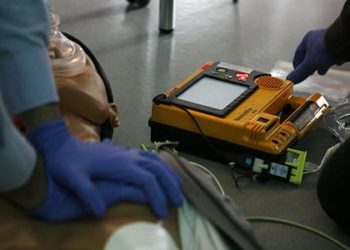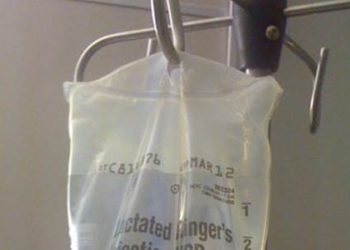[Physician Comment] "Helping Babies Breathe" training linked with fewer stillbirths in developing countries
Jan 26th – Training birth attendants with the Helping Babies Breathe program reduced stillbirths with no increase in neonatal mortality.
[tabs tab1=”2MM Rundown” tab2= “2MM Full Report” tab3=”About the Authors”]
[tab]
Image: PD
1. Training birth attendants in Southern India with the Helping Babies Breathe program reduced stillbirths with no increase in neonatal mortality.
2. Skills training in basic neonatal resuscitation may affect a reduction in overall neonatal deaths in developing countries.
Training providers in neonatal airway resuscitation using the Helping Babies Breathe program significantly improved rates of stillbirth while causing no increase in rates of neonatal mortality, suggesting that resuscitated neonates went on to survive the neonatal period. These findings suggest that a skill-based educational program in basic neonatal resuscitation may be effective at reducing overall neonatal deaths in developing countries. The main limitations of this study lie in the statistically significant differences between the pre and post intervention groups, which suggest the two populations may be distinct and/or that factors other than the type of newborn care provided may account for the decrease in stillbirths. However, these differences may have been unavoidable in this setting. The large-scale nature of this study was a major strength. While the HBB program is promising, further research is needed to evaluate its impact on overall neonatal mortality.
Click to read the study in Pediatrics
[/tab]
[tab]
Image: PD
Study author, Dr. Shivaprasad Goudar, M.D., talks to 2 Minute Medicine Research Coordinator, Women’s and Children’s Health Research Unit, KLE University’s J N Medical College
“The results of the study demonstrate that many of the fresh stillbirths could be averted by training birth attendants to initiate prompt resuscitation (stimulation, suction and bang and mask ventilation) in babies that do not breathe spontaneously after birth. In fact newborn resuscitation modeled on HBB curriculum needs to be incorporated in pre-service training of all types of health care providers. Rolling out HBB training across the world can definitely help in attaining Millennium Development Goal 4. It is a simple educational intervention that does not require sophisticated equipment”
1. Training birth attendants in Southern India with the Helping Babies Breathe program reduced stillbirths with no increase in neonatal mortality.
2. Skills training in basic neonatal resuscitation may affect a reduction in overall neonatal deaths in developing countries.
This [prospective] study trained a total of 599 birth attendants from rural primary health centers and district and urban hospitals in Karnataka, India using Helping Babies Breathe (HBB), a basic neonatal resuscitation education program developed by the American Academy of Pediatrics. A total of 4139 women delivering 4187 infants were in the pre-intervention period compared with 5335 women delivering 5411 in the post-intervention periods. The primary outcomes evaluated were rates of stillbirth and neonatal mortality. Secondary outcomes were HBB acceptance by providers and improvement in provider knowledge and skills. Outcomes were compared before and after the initiation of HBB training.
The incidence of stillbirth was significantly lower in the post-intervention (HBB) group (2.3% vs 3%, p=0.035), while the incidence of neonatal mortality was statistically equal (1.8% vs 1.9%, P=.59). Results found that HBB training significantly increased trainees’ knowledge scores (p<0.001).
Further reading:
- Global, regional, and national causes of child mortality: an updated systematic analysis for 2010 with time trends since 2000.
- Newborn-care training and perinatal mortality in developing countries.
- American Academy of Pediatrics. Helping Babies Breath. The golden minute.
- Helping Babies Breathe: global neonatal resuscitation program development and formative educational evaluation.
- UpToDate: Neonatal resuscitation in the delivery room.
In sum: Training providers in neonatal airway resuscitation using the Helping Babies Breathe program significantly improved rates of stillbirth while causing no increase in rates of neonatal mortality, suggesting that resuscitated neonates went on to survive the neonatal period. These findings suggest that a skill-based educational program in basic neonatal resuscitation may be effective at reducing overall neonatal deaths in developing countries. The main limitations of this study lie in the statistically significant differences between the pre and post intervention groups, which suggest the two populations may be distinct and/or that factors other than the type of newborn care provided may account for the decrease in stillbirths. However, these differences may have been unavoidable in this setting. The large-scale nature of this study was a major strength. While the HBB program is promising, further research is needed to evaluate its impact on overall neonatal mortality.
Click to read the study in Pediatrics
By [MS] and [LH]
More from this author: Influenza infection during pregnancy associated with increased risk of fetal death, [Physician Comment] No-cost contraception reduces unintended pregnancies
© 2013 2minutemedicine.com. All rights reserved. No works may be reproduced without written consent from 2minutemedicine.com. Disclaimer: We present factual information directly from peer reviewed medical journals. No post should be construed as medical advice and is not intended as such by the authors or by 2minutemedicine.com. PLEASE SEE A HEALTHCARE PROVIDER IN YOUR AREA IF YOU SEEK MEDICAL ADVICE OF ANY SORT. Content is produced in accordance with fair use copyrights solely and strictly for the purpose of teaching, news and criticism. No benefit, monetary or otherwise, is realized by any participants or the owner of this domain.
[/tab]
[tab]
 Maren Shapiro: Maren is a 2nd year M.D. Candidate at the University of Pennsylvania.
Maren Shapiro: Maren is a 2nd year M.D. Candidate at the University of Pennsylvania.
 Leah Hawkins: Leah is a 5th year M.D./MPH candidate at Harvard Medical School.
Leah Hawkins: Leah is a 5th year M.D./MPH candidate at Harvard Medical School.
[/tab]
[/tabs]



![The ABCD2 score: Risk of stroke after Transient Ischemic Attack (TIA) [Classics Series]](https://www.2minutemedicine.com/wp-content/uploads/2013/05/web-cover-classics-with-logo-medicine-BW-small-jpg-350x250.jpg)
